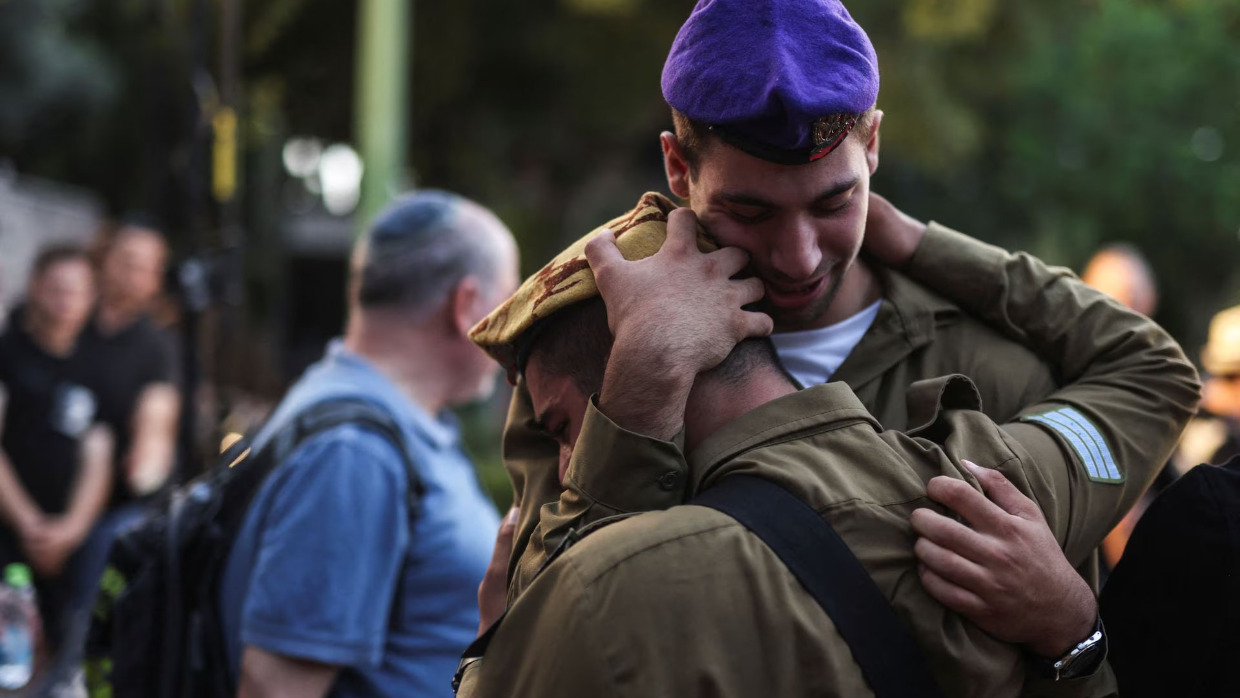 Vampire Weekend's Surprising Jewish Stories
Vampire Weekend's Surprising Jewish Stories


4 min read
How a culture deals with its dead reflects its attitude towards life.
In Judaism, the preservation of life is the most sacred value, and care for the deceased is considered one of the most praiseworthy actions. Indeed, it is known as “true kindness,” because the receiving party can never return these acts of kindness.
After last Saturday’s horrific massacre, thousands of bodies were left to be cared for – a majority of whom were Jewish Israelis, but Hamas terrorists also killed foreign agricultural workers and even Arab-Israelis who happened to be in the area. Given the sheer volume of missing people and bodies for Israeli officials to collect and process before families could be informed and funerals held, the country turned to volunteers to assist in the process.
Moish Miniker’s good friend Motti has volunteered for Zaka for 25 years, an Israeli search and rescue organization who were the first to arrive on the scenes of the Re’im music festival, where 260 concert-goers were brutally murdered, on Saturday afternoon on the Sabbath itself. “Because it is so important for us as Jews to respect and dignify the body, we do it as soon as possible, even on the Sabbath, when work is generally prohibited.”
 Moish Moniker
Moish Moniker
When Moish heard from his friend Motti about the disaster scene Saturday night, he felt a duty to act. “I considered the security risks,” -- terrorists remained on the loose in the area – “but I also considered the biggest mitzvah that was involved – burying the dead.”
On Sunday morning, he joined a crew of six with an ambulance truck down Route 232, the road leading away from the festival grounds. On the destroyed road they found the remains of “people who were running from the music festival and there were terrorists waiting for them on that road. While they were driving away they basically shot at cars and killed the people inside. Some of them even had headshots like they made sure after they shot at them that they were killed.”
When he arrived at the festival grounds themselves, it was somehow even worse. “I cannot really describe in detail the unspeakable and indescribable things done to the bodies of children, babies, the elderly.” The bodies were brought to the makeshift Zaka headquarters there. While caring for the bodies, “there was a firefight between terrorists and Israeli soldiers about 100-150 meters from us. They told us to get down on the side of the road and climb into a pit,” he said.
Some of the bodies recovered were so badly mutilated that identification through dental records was required for verification. Dr. Tzippy Davidovitz of the Sheba Medical Center, an oral medicine specialist who serves once a month treating dental patients for the army, didn’t hesitate to perform this mitzvah.
 Dr. Tzippy Davidovitz
Dr. Tzippy Davidovitz
“I got there Sunday morning and it was overwhelming,” she said. “I don’t have the words to express the situation. The professional part was not the problem – it is not difficult for any dentist or medical specialist to compare ante-mortem and post-mortem dental records. The difficult part was to see the condition the bodies were in.” That included a person who was beheaded, victims burnt and shot directly in the skull, and those murdered in their pajamas.
“The next morning I heard the news and they were saying the names of the soldiers who were identified in the last 24 hours and they said one of the names… I said I know exactly who he is, he has implants in 15…” Thanks to her courageous work, this soldier’s family was able to receive some level of comfort.
Both Moish and Tzippy are still struggling with dealing with the emotional toll of their difficult, but rewarding efforts. For Moish, it is not yet possible to think about what he saw: “We are still in the middle and not done yet. For something so insanely horrific, there is no time to think too much. We know eventually it is going to come up and we will deal with it then.”
Let us pray that these heroes receive the care they needed after giving so selflessly.

Our son in law is a member of the IDF Rabbanut's team for identifying the dead. For the last week and a half they have been dealing with the most horrific things, not imaginable. Things out of horror stories of the middle ages. Barbaric.. True, bodies can be identified by dental xrays, provided the head is connected to the body....By the end of last week, the situation was such that identification was possible only by means of DNA tests.
And the world is still only concerned with the humanitarian crisis in Gaza! The Israelis (and foreign citizens among them) abducted to Gaza don't interest them! That, in their opinion is not a humanitarian issue.
Please daven for geula shelema bekarov.
The heroic acts of our people are amazing. May HaShem bless the souls of those whose lives were lost and May he bring healing to those who brought a small sense of comfort to the mourning families.
"Mi k'amcha Yisrael"!
'Heroic' doesn't begin to describe Zaka & other volunteers' actions; 'altruistic' gets closer.